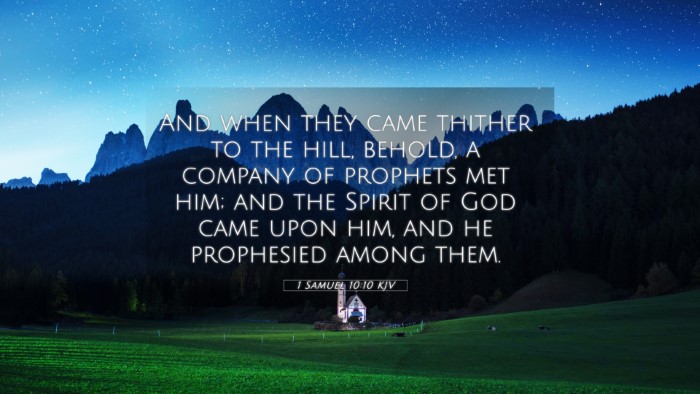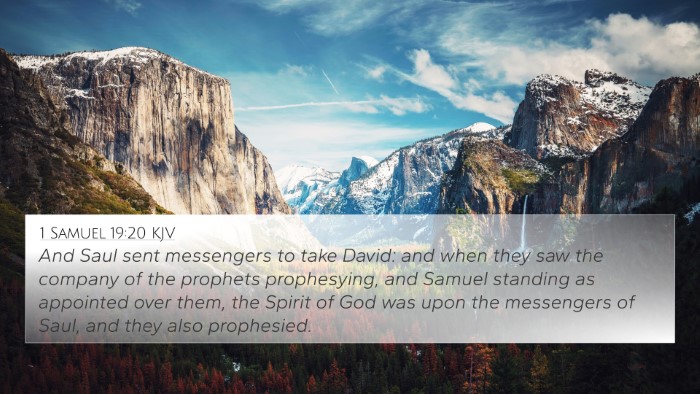Understanding 1 Samuel 10:10
1 Samuel 10:10 states:
"When they came to the hill, there met him a company of prophets, and the Spirit of God came upon him, and he prophesied among them."
Summary of the Verse
This verse captures a pivotal moment in the life of Saul, who is to be anointed king over Israel. It depicts the profound experience of being led by the Spirit of God, showcasing divine empowerment for his future role. The arrival of a company of prophets signifies the community of divine purpose and the anointing that comes upon individuals chosen by God.
Commentary Insights
Matthew Henry's Commentary
Divine Encounter: Henry emphasizes that Saul’s encounter with the prophets exemplifies God's active role in guiding leaders. The meeting on the hill was not mere coincidence, but divinely orchestrated. The arrival of the prophets heralds Saul’s transformation and marks the beginning of his reign.
Spiritual Empowerment: He highlights that the Spirit of God coming upon Saul represents empowerment for service, illustrating the essential nature of divine assistance in leadership. Like the prophets, Saul is given a mission that requires both wisdom and spiritual fortitude.
Albert Barnes' Notes
Prophetic Community: Barnes discusses the significance of a group of prophets. The collective prophecy serves as a demonstration of God’s presence, acting as confirmation of Saul’s calling. This communal observance illustrates how the prophetic gift functions within the broader community of faith.
Transformation Through the Spirit: Barnes also notes the transformational aspect that the Spirit of God brings to Saul, indicating that this spiritual change equips him to fulfill his duties as king. This moment signifies a crucial point of inner change that would influence Saul's leadership.
Adam Clarke's Commentary
Symbol of Anointing: Clarke adds that Saul’s prophesying is a symbolic act, representative of his new status as a king chosen by God. This prophesying illustrates the authority and grace granted to him through divine selection.
Connection with Prophets: He also underlines that this event connects Saul with the prophetic tradition in Israel, indicating that a true leader should be in communion with God's word and the prophetic vision.
Cross-References to Consider
- 1 Samuel 10:6 - The Spirit of the Lord will come upon you.
- Acts 2:4 - They were all filled with the Holy Spirit and began to speak in other tongues.
- 1 Samuel 16:13 - Samuel anoints David, and the Spirit of the Lord came upon him.
- Numbers 11:25 - The Spirit rests on the elders, and they prophesied.
- Joel 2:28 - I will pour out my Spirit on all people.
- Luke 4:18 - The Spirit of the Lord is upon me.
- 1 Corinthians 12:7 - To each is given the manifestation of the Spirit for the common good.
Connecting Themes
This verse invites readers to explore several thematic connections within Scripture:
- Divine Selection: The concept of God choosing leaders is a recurring theme throughout the Bible.
- Empowerment through the Spirit: Many verses illustrate the transformative work of the Holy Spirit.
- Prophecy in the Community: The communal aspect of prophecy reflects the importance of collective faith experiences.
Exploring Inter-Biblical Dialogues
The significance of Saul's prophesying presents an opportunity for comparative analysis with other Biblical narratives. These narratives demonstrate consistent themes of divine intervention, leadership anointing, and communal worship through the prophetic voice.
Guidance for Further Study
For those interested in a deeper understanding of this verse, consider utilizing tools for Bible cross-referencing. A Bible concordance or a cross-reference Bible study guide can provide additional insights into the links and relationships between various scriptures.
Understanding 1 Samuel 10:10 through the lens of cross-referenced themes enriches the study of not only this specific verse but also the overarching narrative of God’s interaction with humanity.
Conclusion
1 Samuel 10:10 encapsulates a moment of divine appointment and spiritual empowerment. Through careful consideration of this passage alongside the insights of well-known Biblical commentators, one can appreciate the rich implications it holds regarding leadership, prophecy, and the transformative work of God’s Spirit.




